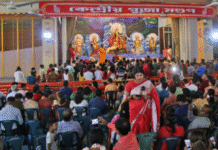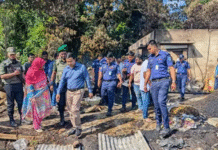ACC finally sues 7, says role of ex-communications boss to be examined during case investigation
After a year-long inquiry into the allegation over Padma bridge project, the Anti-Corruption Commission yesterday sued seven people for conspiring to commit bribery.
The accused include former secretary of the Bridges Division Mosharraf Hossain Bhuiyan, but the anti-graft body did not include in the case former communications minister Syed Abul Hossain and former state minister for foreign affairs Abul Hasan Chowdhury.
Alleged involvement of the two in the graft would be examined during investigation of the case, ACC officials said.
While Mosharraf Hossain has been accused of “deliberately dissolving” four times the evaluation committee for selecting a supervision consultant, his boss Abul Hossain has been mysteriously exempted from the charge.
“Under the Public Procurement Act, the secretary is responsible for constituting and dissolving such committees,” ACC Deputy Director Abdullah Al Zahid told reporters at the commission office in the capital yesterday.
The Act that Abdullah cites indeed empowers the secretary to do so, but not without consulting the minister concerned, especially in case of a big project like that of the Padma bridge.
On the World Bank’s information about bribe money for Abul Hossain, the ACC deputy director said the global lender had given some information but the commission was yet to get any document in support of the allegation.
Ramesh Shah, an SNC Lavalin official now facing trail in Canada over the graft charges, had mentioned in his diary Abul Hossain as the recipient of 4 percent out of 10 percent (Tk 38 crore) bribe from the supervision work money, sources said.
It was not immediately clear if the World Bank would start releasing its fund after the filing of the case.
The six other accused in the case filed with Banani Police Station are Superintendent Engineer of Bangladesh Bridge Authority (BBA) Kazi Mohammad Ferdous, Executive Engineer of Roads and Highway Department Reaz Ahmed Zaber, Deputy Managing Director of Engineering and Planning Consultant, a local agent Canadian firm SNC Lavalin, Mohammad Mostofa and SNC Lavalin officials Mohammad Ismail, Ramesh Shah and Kevin Wales.
According to the case statement, former secretary Mosharraf dissolved the evaluation committee four times between January and June 2010 in efforts to award the consulting job to the company of his choice.
He became head of the fourth evaluation committee, violating WB’s consulting Services Manual of 2006. The manual states that all member of such a committee should have 10 years’ experience in the relevant field, which the secretary lacked.
Kazi Mohammad Ferdous of BBA and Mosharraf prepared a flawed evaluation report to award the job first to a Japanese firm, Oriental Consultation Company Ltd, project director Rafiqul Islam told the ACC inquiry team during interrogation.
Ishtiak Ahmed, who was a member of the fourth committee, also gave similar statements when he was called by the ACC to testify.
However, Ferdous and Mosharraf failed to give the work to the Japanese company in the face of opposition from the other members of the committee.
Mosharraf then set for favouring SNC Lavalin. He along with the six accused persons hatched the conspiracy, the case statement says. They provided SNC Lavalin with secret information regarding the tender.
Despite frantic efforts, Mosharraf could not convince the other members of the evaluation committee to select SNC Lavalin. Failed again, he dissolved the committee and reconstituted it for the fifth time with Prof Jamilur Reza Choudhury as the convener on November 4, 2010.
Ferdous for his part gave more points to SNC Lavalin while evaluating its documents to facilitate selection of the firm. He also exchanged secret information with Lavalin through emails between May and June 2010.
Quoting an email sent by Mostafa to Kevin Wales in June, 2011, the case statement said the bridge authority recommended Lavalin without proper verification of its documents and work history.
When Ismail was sacked from Lavalin, Mosharraf wanted to hold an emergency meeting with Kevin Wales and others. Accordingly a meeting was held on May 5 last year.
Abul Hossain, Mosharraf, Kevin Wales and Mostafa participated in the meeting in the capital. Following the talks, the bridge authority on June 19 last year sent recommendation for work order in favour of SNC Lavalin, said the case document.
Abul Hossain also held several meetings with SNC Lavalin officials, which Abul Hasan arranged. The three SNC Lavalin officials tried to bribe several public and private officials to get the work order but the WB by that time raised allegation of corruption in the project, the case statement added.
Ramesh’s diary seized by the Canadian police also mentioned the names of Abul Hasan, Musharraf and others who were to be bribed. But the ACC is yet to get circumstantial evidence to prove it.
“During the inquiry, we could not seize anything or get anything from other countries…but we can do it now for the investigation,” said the ACC deputy director.
The WB cancelled its $1.2 billion funding on June 29 this year, saying it had proof of a “corruption conspiracy” involving Bangladeshi officials, executives of a Canadian firm and some individuals.
The global lender on September 21 decided to revive the loan after the Bangladesh government agreed to the WB’s terms and conditions.
Source: The Daily Star











Hang the bastards….